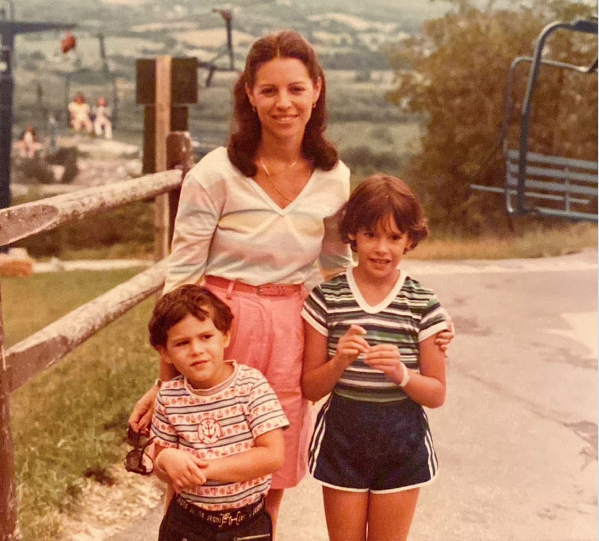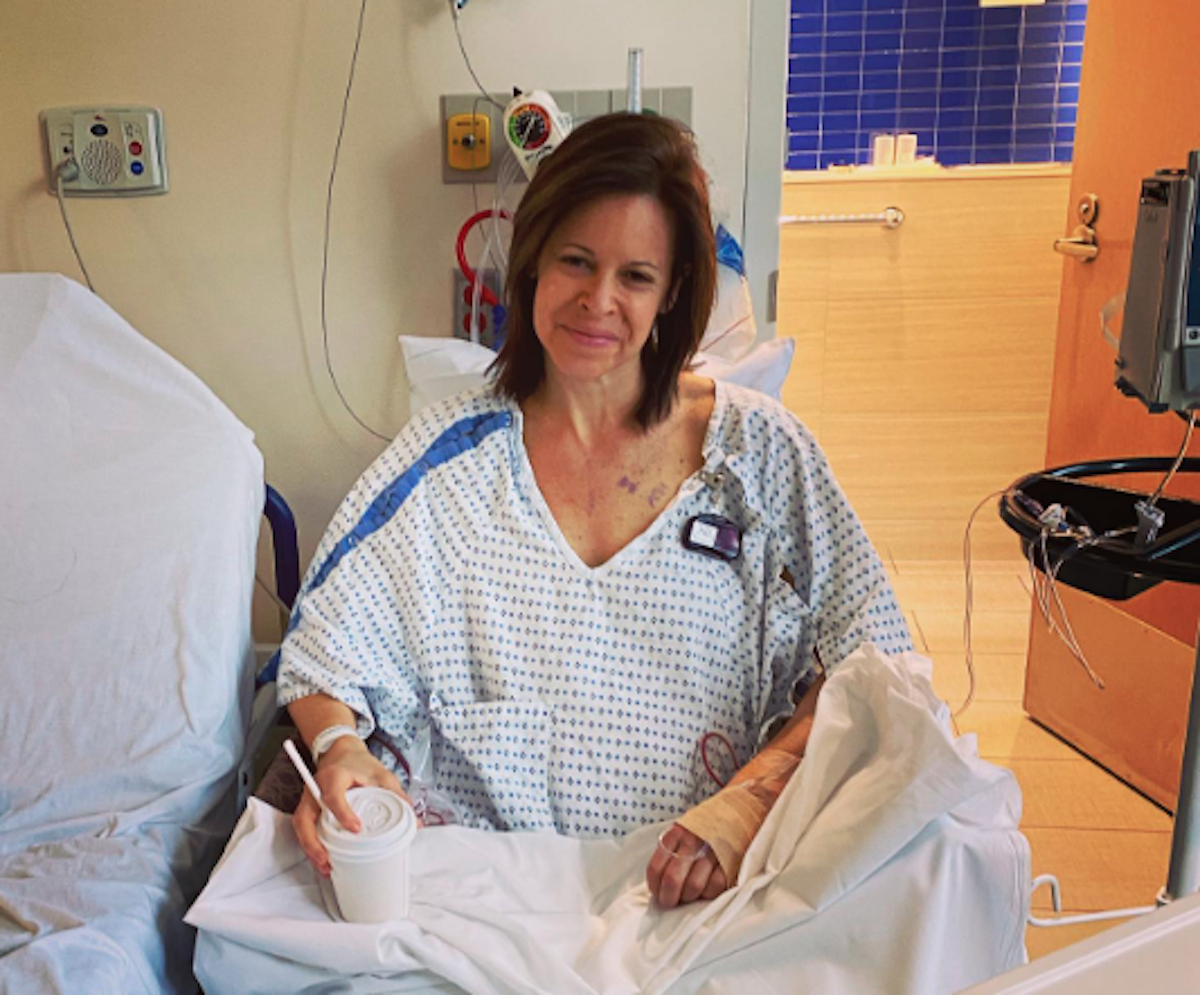Jenna Wolfe's Preventative Surgeries
- Former NBC journalist Jenna Wolfe, 49, said her mom was a huge help when she was recovering from her preventive mastectomy (breast removal surgery) and hysterectomy (a surgical procedure that removes your uterus).
- These procedures helped minimize her risk of developing ovarian and breast cancer because she tested positive for the BRCA-1 gene mutation.
- That mutation is associated with a woman's increased risk of developing breast and ovarian cancers.
- Support during a cancer journey or preventative surgeries, like Jenna Wolfe had from her mom, is essential for recovery.
Wolfe, a Jamaican-American journalist who shares two children with her 51-year-old wife and NBC correspondent Stephanie Gosk, took to Instagram on Mother’s Day to share an adorable throwback photo of her as a child, alongside her mom Sheila Wolfeld and younger brother Michael Wolfeld.
Read More“I think we all wonder a little bit whether our kids will need us anymore when they get older. I'm here to tell you they will. They may not say the words, but you'll know. Just like I knew,” Wolfe concluded. “Love you mom.”

Wolfe’s mom had been by her side as she recovered from a preventive mastectomy (breast removal surgery) and hysterectomy (a surgical procedure that removes your uterus) – surgeries which she previously admitted were “worth it” if they helped decrease her higher risk of developing ovarian and breast cancer.
These procedures made her a previvor.
RELATED: Jenna Wolfe Knew She Had a Higher Risk of Breast Cancer So She Had Preventive Mastectomy
She underwent the procedures after announcing that she has tested positive for the BRCA-1 gene mutation, a gene linked with woman's increased risk of developing breast and ovarian cancers.
Although Wolfe has not revealed how she came upon her decision to undergo genetic testing, it’s likely because her mom has “just beat” stage 3 breast cancer, People magazine reported.
What is Stage 3 Breast Cancer?
The first procedure Wolfe underwent was the hysterectomy, something she described on Instagram as “not fun, not easy, not at all pleasant” adding, “(I'm terrified of needles) but it's something I need to do.”
Expert Cancer Resources
Then, two weeks later, she underwent the mastectomy, explaining in another post, “Mastectomy behind me. All that's left now is recovery and healing… The most important part. The hardest part. I FaceTimed with my kids tonight and the little said to me, ‘you always say we can do hard things, mama. Now we're telling you the same thing. You got this. We love you.'”

Support During a Cancer Journey or Preventative Surgery
Support during a cancer journey or preventative surgeries, like Jenna Wolfe had from her mom, is essential for recovery.
“Studies have found consistently that loneliness is a significant risk factor for physical and mental illnesses and the trajectory of recovery,” licensed clinical psychologist Dr. Marianna Strongin previously wrote in a column for SurvivorNet.
Ovarian Cancer Survivor Stresses the Importance of Finding Support Through Your Journey
“Therefore, it will be important that you surround yourself with individuals who care and support you throughout your treatment.”
Aside from family, friends and therapy, support groups, social media and community groups such as church groups or athletic teams can all be great places to combat loneliness during a cancer battle.
A Cancer Survivor's Ode To Friends and Family: “My Support System Helped Me Heal”
No matter what you decide to do, consider opening up to at least some people. You never know how much it could help you, or those around you, unless you try.
When to Consider Preventative Surgery
According to the American Cancer Society, women may choose to undergo preventative surgery if they:
- Have a BRCA1 or BRCA2 gene mutation (or other genes that raise breast cancer risk) found through genetic testing
- Have a strong family history of breast cancer (for example, if a few close relatives have the disease, or if breast cancer has been diagnosed in at least one relative at a young age)
- Underwent radiation therapy to the chest prior to turning 30 years old
- Have (or have had) cancer in one breast
The American Society of Clinical Oncology explains that germline mutations in BRCA1 or BRCA2 genes increase a woman's risk of developing hereditary breast or ovarian cancers and a man's risk of developing hereditary prostate or breast cancers.
What Are the Options if You Have a High Risk of Developing Breast Cancer?
These mutations also raise the risk of pancreatic cancer and melanoma in women and men. Thankfully, genetic testing is one way to know your inherited risk of developing certain cancers.
Dr. Elisa Port, a surgical oncologist at Mount Sinai, told SurvivorNet in an earlier interview, “Genetic testing is an exploding area, and it started out with a very narrow field of women and men who were recommended to have it based on certain risk factors, family history of breast cancer or other cancers and also ethnic backgrounds.”
“We now feel that casting a wider net with genetic testing is probably very prudent because finding out that one has a cancer predisposition gene can definitely change their course, their risk for cancer and what they might want to do about it,” she explained.
Genetic Testing for Breast Cancer: What is This Type of Test? And What Do My Results Mean?
There are many different gene mutations that can raise your risk of specific cancers, however, as it’s connected to Wolfe’s case, we're focusing on the BCRA mutation.
BRCA is actually two genes (BRCA1 and BRCA2). BRCA1 (BReast CAncer gene 1) and BRCA2 (BReast CAncer gene 2) are genes that produce proteins that help repair damaged DNA, according to the National Cancer Institute.
Everyone is born with two copies of each of these genes, one inherited from each parent. If either parent carries a BRCA gene mutation, there's a 50-50 chance the child is carrying it as well.
RELATED: The Pros and Cons of Prophylactic Surgery for Ovarian Cancer
When these tumor suppressor genes have certain mutations or changes, cancer can develop raising men's and women's risk levels for breast cancer as well as several other cancers, most notably ovarian cancer.
“If a woman has one of these mutations the genetic BRCA1 and (BRCA)2 mutations, it puts her at basically the highest quantifiable risk for getting breast cancer,” Dr. Port explained. “We typically say between the 60 (percent) and 80 percent range.”
“Specific mutations in BRCA genes lead to an increased risk of developing breast cancer,” Dr. Freya Schnabel from the NYU Langone Medical Center previously told SurvivorNet.
MORE: What Is a BRCA Mutation?
“People who have a family history of breast or ovarian cancer may want to consider being tested for mutations, particularly if the relative was diagnosed with cancer before age 50.”
Questions to Ask Your Doctor
- What is my genetic risk for developing breast or ovarian cancer?
- What tests can determine my risk?
- What are my options if I test positive for a BRCA gene mutation?
- Is a preventive mastectomy of hysterectomy right for me?
- What is the recovery process like for the procedures?
Contributing: SurvivorNet Staff
Learn more about SurvivorNet's rigorous medical review process.

